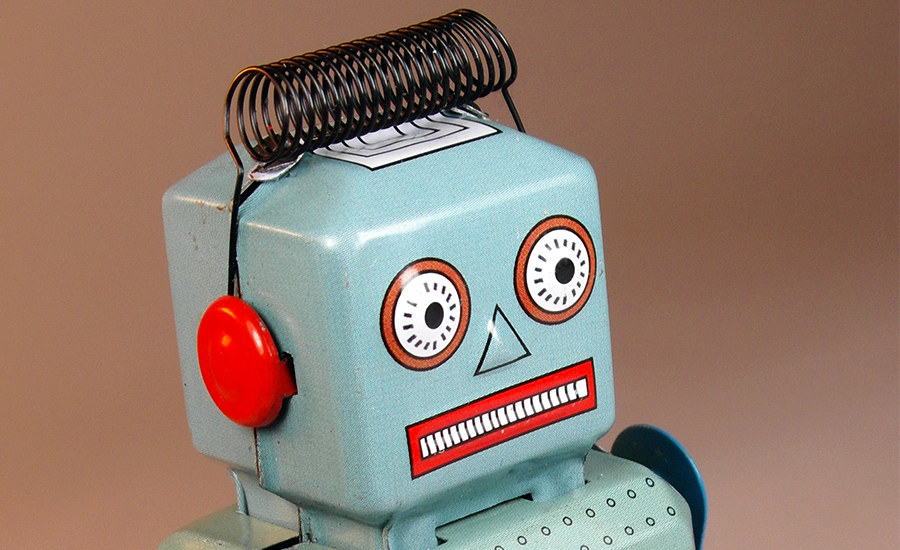What's New Thu 3rd August, 2017
Building Better Bots: can next-gen tech make the world a better place?
Equal Experts is sponsoring ‘Building Better Bots’, an event at this year’s Brighton Digital Festival. To explain more, Robin Christopherson – Head of Digital Inclusion at UK tech charity AbilityNet – asks whether the next generation of tech will make life better for disabled people:
We’re seeing a revolution in the power and capabilities of mainstream technology. Hardware costs are falling, software is becoming more intelligent, our phones, cars and washing machines have more and more computing power. We’ve moved way beyond the mobile revolution into the age of ‘ambient computing’.
Every day brings new stories about AI, bots and robots – from BBC stories about faking Obama’s mouth movements to DeepMind beating humans at Go and Honda using IBM Watson for its F1 IOT systems, these stories are popping up on everyone’s news feeds.
What’s a bot?

Not the bot you’re looking for.
In this fast moving space the term bot is used in various ways, but in this case I’m referring to those digital tools or services that use these new capabilities – software that draws on the power of AI and/or the internet of things to create new functionality. Bots are linked to this next generation of tech in the way that Apps are now synonymous with mobile.
Chatbots are already increasingly common on websites, whether offering pre-qualification for insurance products or simply serving as glorified FAQs. We’ve had Siri for several years now, and I’ve been living with Alexa and my Amazon Echo Dot for almost a year. By my definition, the Alexa skills I blog about are also bots.
I’m thinking of services such as C The Signs, which uses a form of AI to help early diagnosis of cancer. There are also apps and bots that use image recognition to help people with disabilities and the tech giants are competing to sell us the Bots that will control our homes.
In short the world isn’t short of bots, or people talking about AI – but why is it of interest to AbilityNet?
Using tech to make the world a better place
AbilityNet is a charity that helps disabled people use tech to achieve their goals at home, at work and in education – any disability, any age, any digital technology.
We started life in the 1990s, helping people like Prof Stephen Hawking use then-cutting edge tech such as voice recognition. Twenty years ago we spent most of our time talking about highly specialist and often very expensive technologies, that had to be carefully customised. These days we very often recommend mainstream technologies – and they’re usually built into the phone or PC in front of you.
There are an estimated 12 million disabled people in the UK, and the great lesson is that one size doesn’t fit all – there isn’t one app for blind people, or a piece of software that solves every problem for people with dyslexia. Every person has different needs, depending on the obstacles they face and the tasks they’re trying to complete.
So what can this next generation of technology offer disabled people?
A new kind of interface
The best place for me to start is voice controlled interfaces.
I am completely blind and even though I have learned touch typing, I use the power of my voice everyday – from dictating emails and reports, to asking Siri or Alexa to help with daily tasks such as checking train timetables. The speed and accuracy of the voice interface has improved at an incredible pace in recent years; it no longer needs extensive training and is built into phones, TVs and many other interfaces.
And how about autonomous cars? Like most people who are blind or have physical disabilities, I can’t wait to tap my phone and jump into my own car whenever I fancy – free to go wherever I please.
So much potential…
But before I get carried away, we need to sound a warning signal about the way that tech is built and the barriers we are likely to face in achieving this dream.
I’ve been involved in digital tech for over 20 years, and as each wave of tech has come along we’ve seen almost as many barriers as opportunities. Whether that is websites that are not accessible, apps that can’t be used by disabled people or services that can’t be used by people with particular impairments, I know from bitter personal experience that accessibility doesn’t happen by accident.
The good news is that progress can be made. We work with clients such as Barclays Bank, which is embracing inclusive design and building accessibility into all its digital products and services. It recognises the moral case for better design, but also embraces it for commercial reasons – what if millions of people with dyslexia prefer someone else’s bot because they’ve designed it better than yours?
It’s about people, not technology
Anyone building the bots of the future needs to work to agreed standards. The next version of the globally agreed Web Consortium Accessibility Guidelines (WCAG) will encompass mobile standards. But will they be relevant in the age of AI? How will we test a bot – in all its various forms – for accessibility?
Another thing to consider: there are ethical and legal issues relating to disability. When will it be legal for a blind person to travel unaccompanied in an autonomous car? What about someone with a learning disability? At what level of impairment will the solo traveller be kept off the roads?
Similarly, we’re all worried about bots taking our jobs, but how many employers will level the recruitment playing field for people with disabilities, when at the same time they may be using bots to outstrip even their able-bodied counterparts? What will the law say when you may be able to choose between an exceptionally brainy Bot and a human for your next hire?
Our event at Brighton Digital Festival, sponsored by Equal Experts, is a chance to explore these questions in more detail. We want to engage with the humans who are building bots, as well as some of the people who can benefit from them. I hope you can join us there.
More info:
- Building Better Bots, an event as part of Brighton Digital Festival, 6pm, Tuesday 10 October: hear Robin and other expert speakers shining a light on the way that bots can make the world a better place
- Listen to Robin’s Dot to Dot podcast about the Alexa skills he uses
- Robin is also talking at Dots conference as part of Brighton Digital Festival on 29 September


